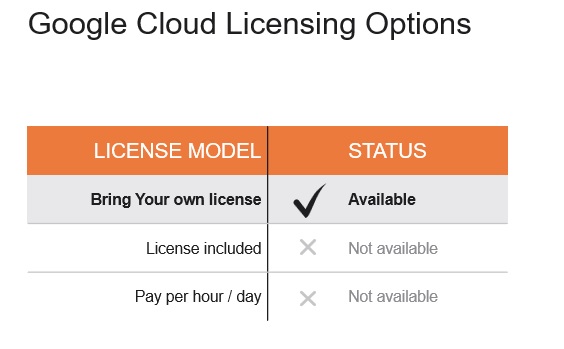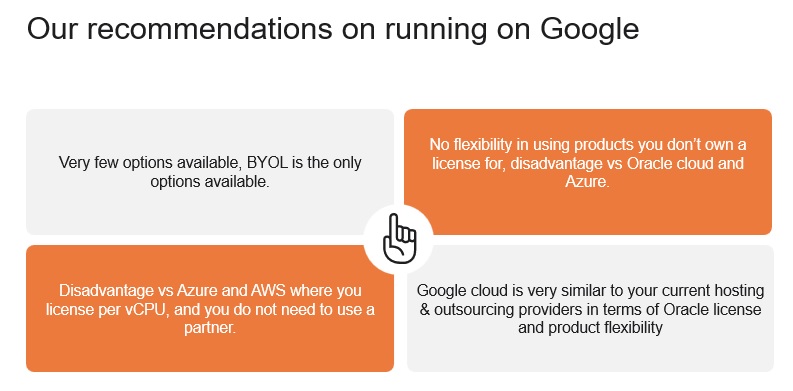
Oracle licensing Google Cloud
Short answer:
Oracle licensing on Google Cloud offers two licensing options for Oracle: GCP and Bare Metal. Google Cloud is a computing service provided by Google that allows customers to use Google’s infrastructure and run applications. However, it is important to note that Oracle does not recognize Google’s hypervisor, meaning that you should follow Oracle’s licensing policy documents when deploying Oracle on GCP. In this case, you should treat Google Cloud as a traditional outsourcing or hosting provider when it comes to Oracle licensing. Oracle has not recognized Google Cloud as a public cloud provider, so you should treat your deployments on Google Cloud as on-premises deployments. Some on-premises customers may ignore Oracle’s soft partitioning document and treat GCP Oracle the same way as they do on-premises, but it is important to be aware of the potential risks and consequences of this approach. AWS and Azure has licensing rules using vCPU, but Google does not.
Oracle licensing policies
Oracle licenses its technology products based on hardware specifications for both user licensing and processor licenses. To license Oracle, customers are required to pay per core or per processor. Oracle does not consider many virtualization technologies as a way to limit licensing when servers are combined into clusters, as outlined in the Oracle soft partitioning policy guide. This means that if Oracle is run on two virtual CPUs (vCPUs) on a server within a virtualized cluster with one hundred physical cores, the customer is required to purchase a license for all one hundred physical cores, not just the two vCPUs assigned to the Oracle deployment.
Google Bare Metal Solutions – Oracle Licensing
To license Oracle on Google’s bare metal solutions, you will need to calculate your licensing requirements in the same way as you would for an on-premises deployment. Google does not offer any “license included” solutions, so you will need to bring your own Oracle licenses and use them as a “bring your own license” (BYOL) solution. For example, if you need 32 cores of Oracle Database Enterprise Edition (EE) on Google Cloud Platform/bare metal, you will need 16 processor licenses of Oracle Enterprise Database. This is because Google uses Intel Xeon processors.
Advice for organizations who wants to use Google Cloud.
- Consider the Oracle soft partitioning policy document (non-contractual).
- Review the Oracle processor definition in your licensing agreement.
- Apply the Oracle core factor table.
- Alternatively, you can choose to disregard Oracle’s licensing policy documents and make your own decisions about running Oracle on the Google Cloud Platform (GCP)
- Use Google Bare Metal Solutions
